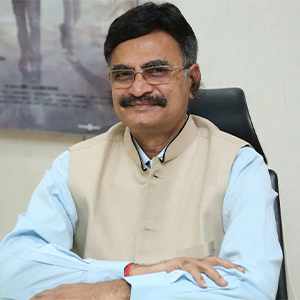 Er. Koneru Satyanarayana is an alumnus of BMS College of Engineering, Bangalore and Satyanarayana began his career in 1977 as an entrepreneur (Coastal Cables Pvt. Ltd, Andhra Pradesh). He also played a critical role in establishing a students’ entrepreneurship cell. In 2009, he became president of KL Deemed-to-be-University.
Er. Koneru Satyanarayana is an alumnus of BMS College of Engineering, Bangalore and Satyanarayana began his career in 1977 as an entrepreneur (Coastal Cables Pvt. Ltd, Andhra Pradesh). He also played a critical role in establishing a students’ entrepreneurship cell. In 2009, he became president of KL Deemed-to-be-University.
Going green is the go-to word for the future sustainability of our planet. Environment safety has gained momentum in recent times. More people have become aware of the dangers of climate change and the relevance of the green revolution. The growing awareness has paved the way for green education and green jobs. Green education empowers children and youth to investigate the environment, solve problems and take action to better the environment. Education for sustainable development give learners skills, values and attitude to address interconnected environment challenges like climate change, loss of biodiversity and unsustainable use of resources.Education for sustainable development inadvertently open the door for new opportunities in Sustainable Development jobs. Sustainable development jobs or green jobs are professional roles committed to environmental preservation, conservation and sustainability.
Importance of Education for Sustainable Development
Education for sustainable development or ESD is an extensive program which offers students hands-on, real-time learning experiences about the sustainability of the environment. Many schools and institutes run green education programs outside the traditional curriculum. The ESD program includes seed and plant identification, organic farming, water conservation, composting, indoor plants, green transportation, and much more. Students learn about global issues such as climate change, water conservation, and soil degradation, as well as how human actions endanger the environment and planet. ESD provide quality education making it significant to boost economic growth. To develop more aware adults about the ecosystem, we have to make our future generation aware from childhood.
Essential Features of Education for Sustainable Development
Education for sustainable development has two vital features: environmental benefit and sustainability. It is imperative to include ecological knowledge and the culture of conservation in the sustainable education program. Eco-friendly methodology and process must use in the teaching method. There must be the use of eco-friendly equipment during the teaching session. Environmental sustainability must be promoted through water conservation, tree-planting campaigns, population management, and other ecologically advantageous activities. Students must be given hands and functional experience along with theoretical learning. This expands their career scope to sustainable development jobs or green jobs.
Essence of Education for Sustainable Development
The essence of education for sustainable development lies in the comprehensive and overall development of the learners. To propel conscientiousness, this develops an understanding of their actions and their consequences. ESD bolster learners with skills, values and attitude to become harbingers of positive change. ESD encourages the amalgamation of interdisciplinary subjects where students acquire knowledge of science, social science, ethics, humanities environment, etc., which provide a comprehensive understanding of sustainability. ESD also fosters the cognition of social, economic and environmental factors in global issues. It develops critical thinking to offer problem-solving issues and develop innovative solutions to meet sustainability challenges.
Types of Sustainable Development Jobs
Professionals in sustainabledevelopment jobs contribute to the sustainability of the environment. Sustainable development jobs are described as minimizing the consumption of energy and raw material. Reduce carbon emissions, waste and pollution, and help communities adapt to climate change. Green professionals promote environmentally conscious decisions and policies, aiming to improve a variety of environmental concerns, such as water and air pollution and make sustainable lifestyle choices accessible to the public. Green professionals help organizations and businesses to make environmentally informed decisions that will help to create safer and better earth. There are many opportunities for individuals in sustainable development jobs who want to make a difference in the environment. In sustainable development jobs, individuals can try energy, agriculture, construction, and waste management. Here is a brief about each sector.
Energy: In the energy sector, green job aspirants can create, install and fund renewable energy sources like solar and wind.Renewable energy specialists assess studies on emerging technologies, understand environmental impacts of energy production, and transfer their understanding to practical business strategies.
Agriculture: In the agriculture sector, include, greenagriculture and the development of eco-friendly methods and techniques in agriculture. Green Agriculture is sustainable farming based on environment conservative philosophies, policies and practices to prevent the degrading of the ecosystem in this sector, individuals can help grow crops organically and also apply conservation methods to conserve soil and nature.
Waste Management: Waste recycling is a significant component of green jobs. The green jobs generally include collection and coordination in recycling. Waste recycling is a recovery operation where waste is reprocessed as product, material etc. Green jobs help to improve efficiency in energy and raw material use, limit greenhouse gas emissions, reduce volumes of waste created and volumes brought to landfill to protect and restore ecosystems.
Transportation: To promote clean vehicles with minimum carbon emission. Manufacture electric vehicles to minimize environmental pollution for a more sustainable living.Green jobs in the automotive industry can include both Hybrid and Electric vehicle production, sales, and repair. Many of these positions are in a specialized field and can be considered environmentally friendly
The Green Revolution will augment the environment, protect the environment and boost the workforce. The relevance of education for sustainable development and jobs cannot be underestimated for a sustainable future of our planet. Sustainable development jobs provide employment opportunities, the largest we have seen so far. Environmental sustainability is a priority at present. Environment sustainability jobs are considered critical in businesses. ESD will build a more environmentally conscious generation with a better understanding of climate change adaptation. Education for sustainable and jobs are the future of the country.